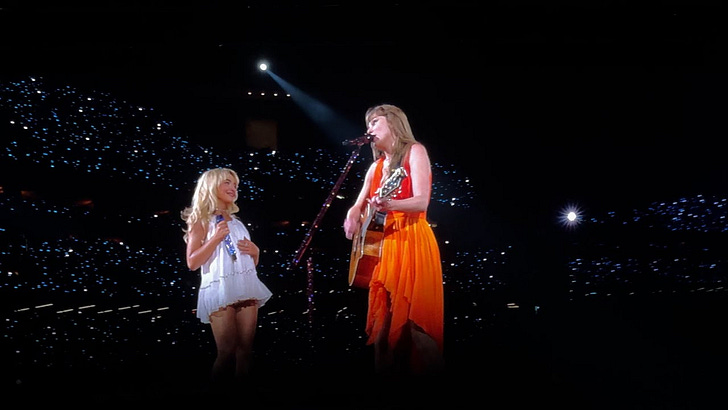The New Pop Star Goddesses
Female pop stars are funnier, angrier, queerer, weirder, smarter—and more powerful—than ever.
Sabrina Carpenter and Taylor Swift recently set their fans aflutter with a duet mashup of their songs “Espresso” and “Is It Over Now?” onstage during Swift’s Eras tour. Besides their shocking height difference, what was remarkable about this appearance was the sense that Swift was anointing Carpenter, who’s about a decade her junior, as part of the next generation of powerful Pop Star Goddesses. Where once Madonna kissed Christina Aguilera and Britney Spears during an MTV Video Music Awards performance meant to shock, Swift is now calmly saying to Carpenter, while playing acoustic guitar onstage at the biggest pop tour in recent memory, one built on her own lifetime of work: “Your lyrics are worth singing here, too.”
In fact, in a particularly charming moment, Swift even asks, before doing her verse, “Can I do it?”, explicitly asking for Carpenter’s consent before paying homage.
Pop Star Goddesses are currently more ascendant than ever. Just take a look at the Grammy nominations, where old-school goddesses (Taylor, Beyoncé, and Lady Gaga) and new (Charli XCX, Billie Eilish, Chappell Roan, and Carpenter) absolutely dominate. Meanwhile, Swift and Beyoncé are world powers who endorse presidents in official and business-like ways, even as newspapers step back from the same responsibility.
This all shows how female power has become largely concentrated in the pop star realm over the last 20 years. Feminism and pop stardom have become nearly synonymous since the 2000s, as feminist anthems have proliferated and our two biggest stars, Taylor and Beyoncé, embraced both the term “feminism” and its ethos, and have also become more politically outspoken over the course of their careers. They shape society’s views of feminism and its vision of femaleness. Male pop stars don’t have nearly the same level of responsibility; the closest male equivalent may be rap stars, who are often regarded as male role models but are not required to be good ones.
Female pop stars have evolved even further since my book Pop Star Goddesses came out a mere four years ago. Not every pop star rises to the level of a PSG, who represents something bigger than a hit song.1 But several new stars warrant this status: Eilish, Roan, Charli XCX, Megan Thee Stallion, Olivia Rodrigo, and Carpenter among them. What’s remarkable is the ways that they have taken what Swift, Beyoncé, and Lady Gaga have done, in particular, into thrilling new directions. Here, a few major themes I’ve noticed in the new class.
Subscribe to read on about how the new Pop Star Goddesses are funnier, queerer, and weirder than their predecessors.




